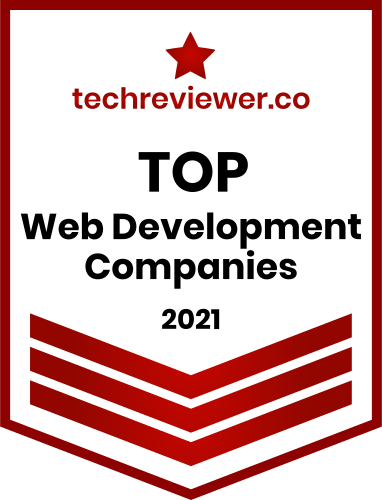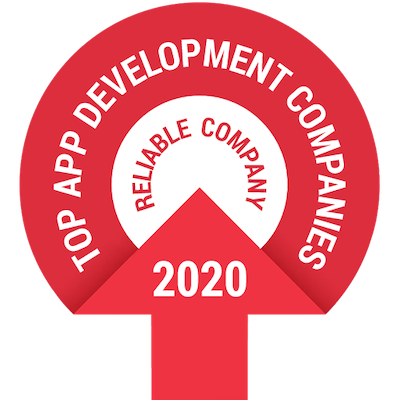
Engineering Management Trends in 2022
The software engineering landscape is constantly evolving, fluctuating, and transforming right before our eyes.
Engineering management has to keep up with that.
We’ve published the first State of Engineering Management report in 2022 to take a snapshot of the current management trends in tech. We intend to repeat this in the following years to track the emergence and decline of different trends.
The report provides data that allows a sneak peek into your peers’ heads, allowing you to compare your own position and activities to other engineering leaders. This insight can help you set the direction for your team and give ideas on how to improve yourself as a leader.
This blog post highlights 15 exciting statistics out of the 30+ that the report covers. Download the full State of Engineering Management 2022 report for even more insight into the latest engineering management trends.
This post covers:
- Leadership self-improvement
- Key soft skills in leadership
- Knowledge sharing
- Hiring and retention
- Hiring methods for developers
- Hiring methods for engineering managers
- Keeping developers motivated
- Keeping engineering managers motivated
- Diversity and inclusion
- The importance of diversity
- Ways to improve diversity
- Remote work
- Emerging challenges due to sustained remote work
- People management
- #1 measured criteria of success of engineering managers
- Primary channels for giving feedback
Leadership self-improvement
“The journey of climbing the leadership ladder is about self-discovery.” We heard this from Mike Seavers while talking about managing managers. It’s so true.
This is exactly why we took a deep dive into self-improvement, looking at it from a number of different angles.
What are the most important soft skills in engineering management?
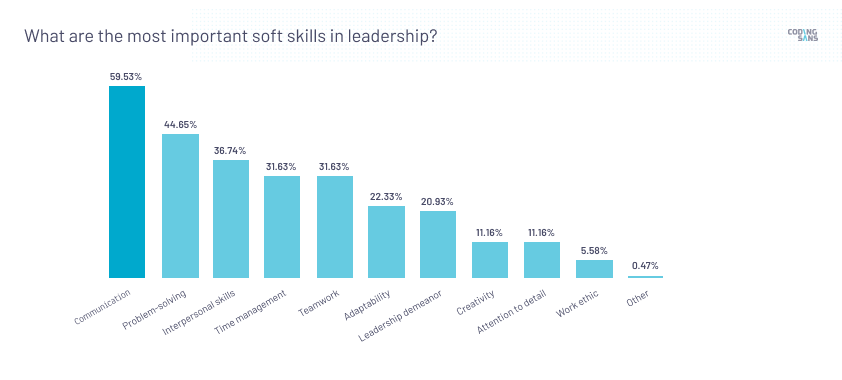
Communication is the single most important leadership soft skill according to our survey; interpersonal skills took third place and teamwork ended up tied for fourth. This came as no surprise. Collaboration is essential in leadership, and the numbers say that some of the most important soft skills are the ones necessary to facilitate it.
Problem solving came up as the second most important soft skill. It makes a lot of sense, as issues that can’t be solved in the frontline tend to end up on the leader’s desk. The most captivating leadership stories are often about firefighting leaders.
Time management ended up tied for the fourth spot, which again, makes sense. Time management for managers is essential to find the necessary time for meetings and for preparation of meetings, while also thinking up solutions to complex problems. You can’t do all that while running around with your hair on fire.
How do you share your knowledge as an engineering leader?
We’re seeing less obvious results as we’re digging into knowledge sharing among leaders.
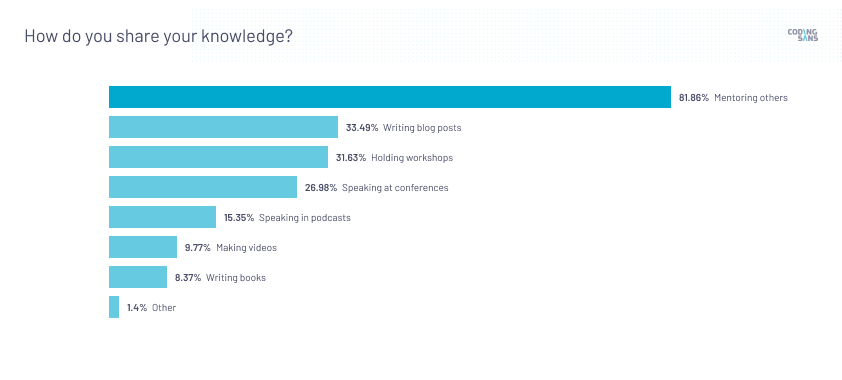
Mentoring other leaders is by far the most popular way for leaders to share their knowledge. This suggests that there is a relatively small amount of engineering management content out there because most leaders prefer to share their knowledge in a private setting.
Writing blog posts came in second, counting less than half as many votes as the first place. Holding workshops came in at a close third. The former is a public activity that contributes most of the engineering management content out there, but the latter can only reach a limited audience.
Speaking at conferences ended up in fourth place. Conferences are a strong platform to reach a wide audience, but it only collected one third of the votes compared to mentoring.
A very interesting part of this finding is that the way leaders prefer to learn about engineering management seems to follow the opposite direction. While mentoring is common, reading blog posts and books is by far the most popular choice for studying among leaders. You’ll find more data on this and top book recommendations by downloading the full report.
Hiring and retention
Hiring has always been a top challenge for leaders in the tech industry, and the pandemic seems to have increased the importance of employee retention on top of that. We took a deep dive into both topics in the survey, investigating these matters when it comes to software developers and engineering managers as well.
What’s your most efficient method to hire developers?
The result for this question is similar to what we’ve seen in the State of Software Development reports in previous years.
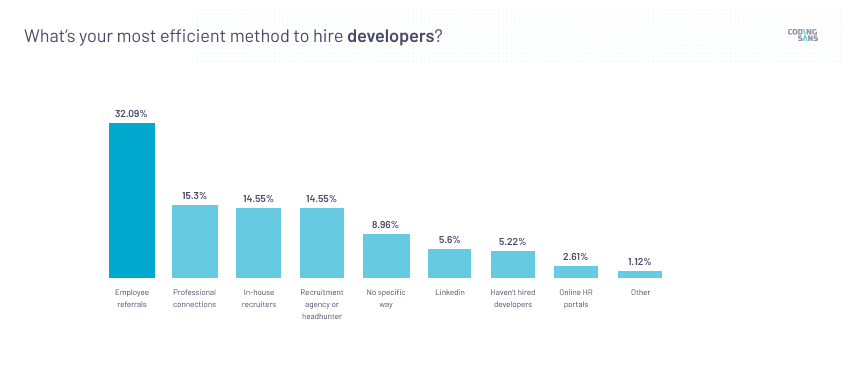
Employee referrals dominate hiring. Research shows that employee referrals help you find hires who are on average better in every dimension.
Professional connections, in-house recruiters and third-party recruiters are all close to each other, but none of them got even half as many votes as employee referrals did.
What’s your most efficient method to hire engineering managers?
Hiring methods get more interesting when it comes to engineering managers. While employee referrals finished at a respectable third place, it doesn't dominate the conversation when hiring for management.
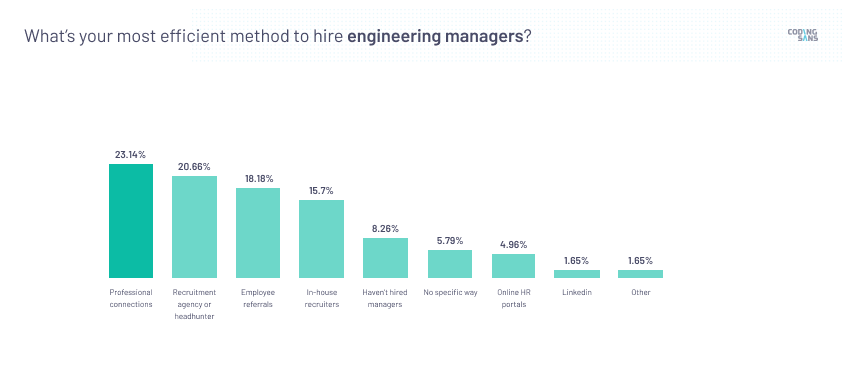
Professional connections are the most efficient method, and third-party recruiters finished in second place. This points to engineering leaders seeing the most success when hiring acquaintances or relying on the expertise of outside sources. The latter explains why engineering leaders reportedly receive so many outreach messages on LinkedIn.
How do you keep software developers motivated?
Motivation is essential to employee retention.
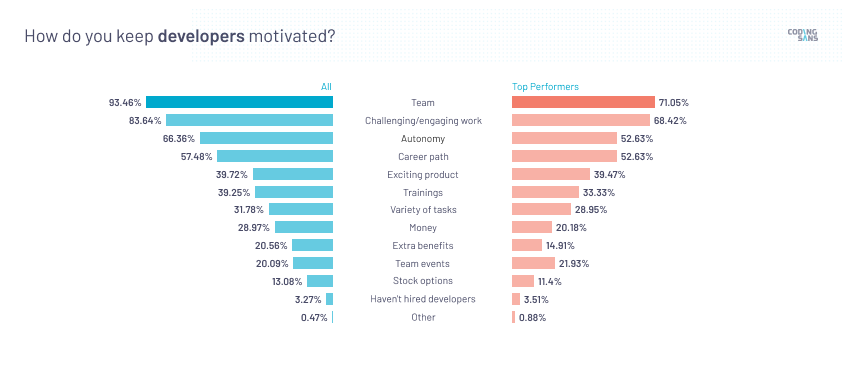
Team came out as the key factor almost everyone focuses on when it comes to making sure software developers stick around at their company. It lines up between top performers and everyone else across the board. Team spirit is important when it comes to attracting talent, but it becomes even more important when you want to retain talent.
Challenging work is equally important, both when attracting and holding on to talent.
Based on the numbers, autonomy is key to making sure that your software engineers stick around. Interestingly, it tends not to be an essential selling point when you’re hiring individual contributors.
On the other hand, money tends to take a backseat when you want to motivate software engineers. It’s an important aspect to get them in the door, but according to our respondents, engineers are far more likely to stick around for the people and the mission over the money.
How do you keep engineering managers motivated?
The motivation of engineering managers seems to only differ slightly from software engineers.
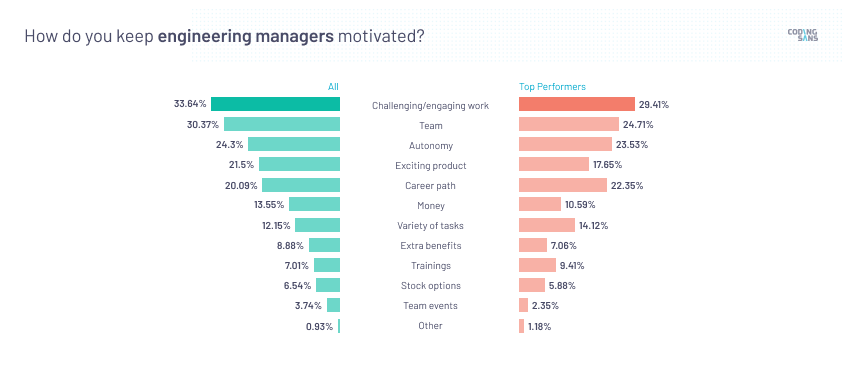
Challenging work is the biggest factor behind their motivation. According to the numbers, your best bet to hold on to your engineering leaders is to make sure they don’t get bored on the job. Michael Lopp has shared a couple of his tips on sniffing out boredom creeping into the minds of your reports before even they realize it.
Team came in as the second biggest factor. Interestingly, the team is a less important selling point when you’re hiring managers, but it’s almost at the top when you’re looking to retain them.
Autonomy is roughly equally important, both when recruiting and when retaining management talent. It’s a good idea to focus on figuring out and communicating the degree and the limits of their autonomy from the moment you define the position and make sure to keep acting it out in the long run.
Diversity and inclusion
How important is diversity in your company?
Diversity has become a key topic in tech over the last decade, and the results back this up.
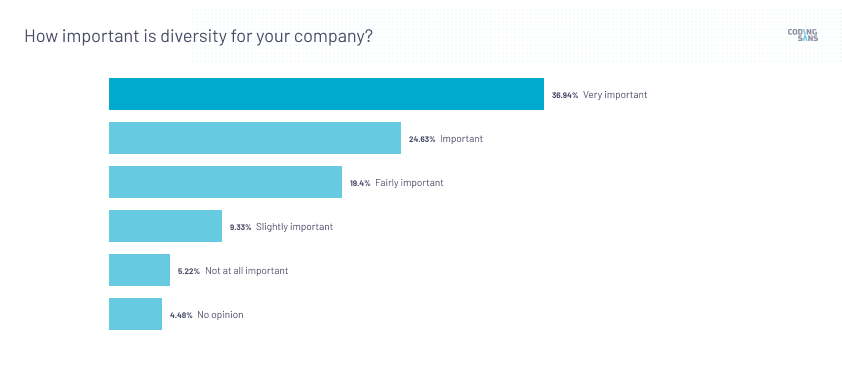
Over one-third of companies consider diversity very important, and another quarter of them consider it important. On the other side of the spectrum, only 5% of companies said diversity isn’t important to them at all.
What have you done to improve diversity and inclusion?
Caring about diversity is a necessary first step, but making your company more diverse and inclusive requires action.
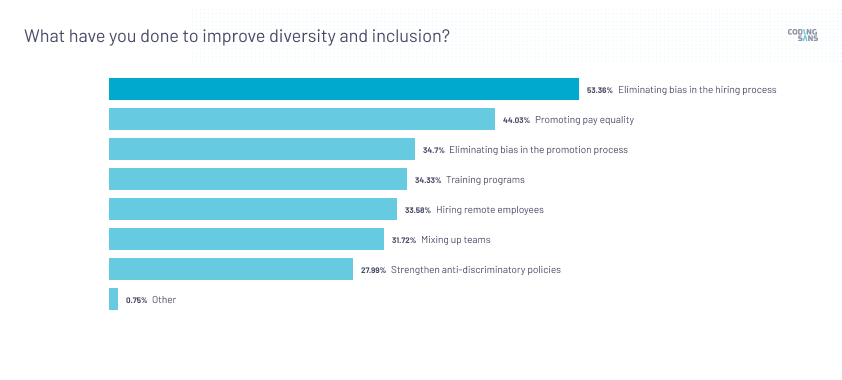
Eliminating bias in the hiring process is the most important focus area for most tech companies by a significant margin. Diversity in recruitment allows you to bring in a range of different people into your company, and it unavoidably moves the needle towards a more diverse workplace.
Promoting pay equality is the number two result in this category. It’s another clear choice by most software companies. Pay equality lines up with the general need of employees for fairness, so it’s worth putting effort into, even if you happen to be in the 5% of companies that don’t prioritize diversity and inclusion.
Remote work
Most tech companies have been working remotely or in a hybrid environment since the pandemic struck in early 2020. The numbers show that hasn’t changed much since previous years, but it has brought its own challenges.
What challenges have emerged due to sustained remote work?
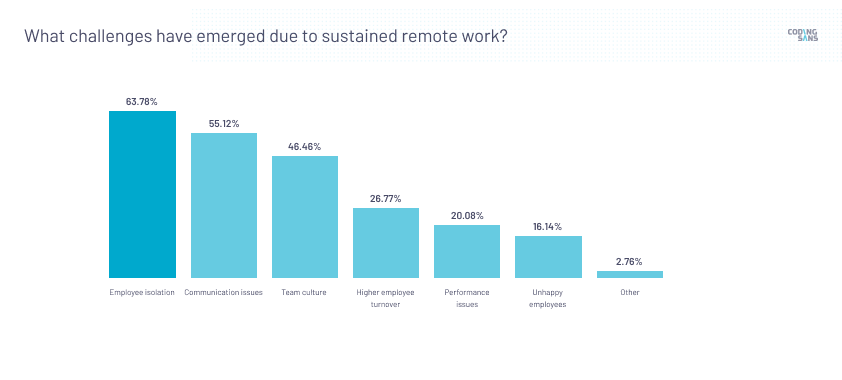
Employee isolation has become a significant challenge for many companies. Experts consider this the main trigger of the Great Resignation.
Communication issues are the second most common type of problem that emerged due to sustained remote work. In the early stages of the pandemic, most of us were focused on setting up communication channels to keep everything going. The industry has found tools that allow for fairly efficient remote communication, but numbers show that it’s far from being a trivial concern.
Team culture is the third aspect that has suffered the most from sustained remote work. Video calls are great, but they can’t fully replace in-person communication. There are ways to build communities online, but it takes hard work to make that happen.
People management
What is the #1 measured criteria of success for engineering managers?
Measuring the impact of management is a complicated matter; there aren’t any widely accepted metrics for it.
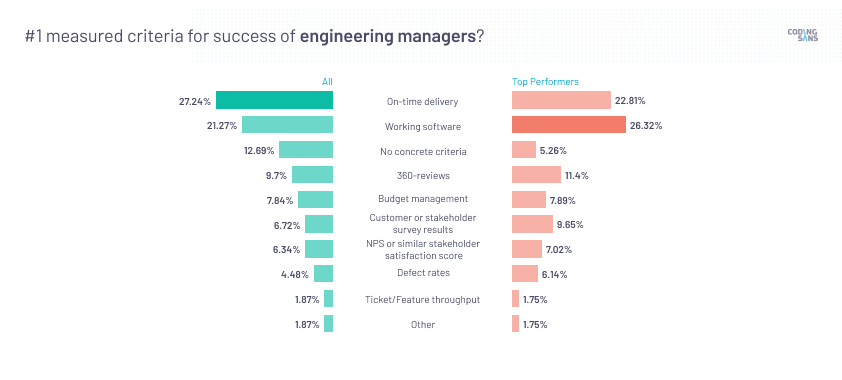
The top two most widely used success criteria that our respondents utilize are working software and on-time delivery. The former is the top choice among top performer teams, while the latter is more widely popular. It’s an interesting discrepancy. You might want to give it some thought within the context of your own team.
Top performing teams are a lot less likely to avoid measuring any success criteria for engineering managers compared to all teams across the board. This suggests that putting effort into measuring your managers’ performance based on any metric could yield better results than not even trying.
What are your primary channels for giving feedback?
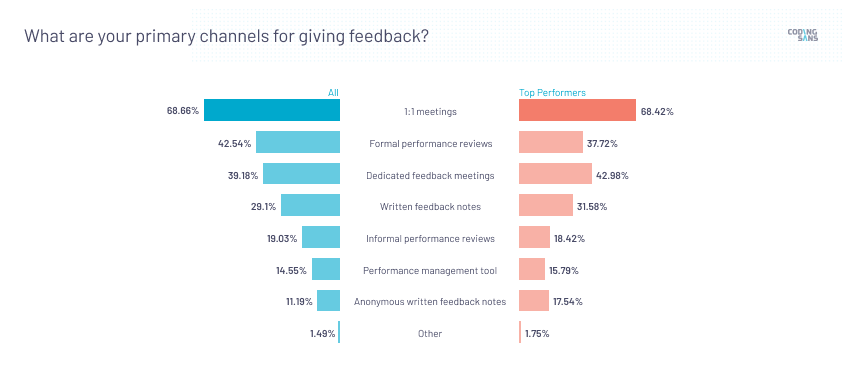
One-on-one meetings dominate the conversation when it comes to giving feedback. It’s the favorite on the side of the top performers as well. If you aren’t doing one-on-one meetings with your reports yet, it’s time you give it a go; most other engineering leaders are doing them already.
Formal performance reviews are essential to a healthy feedback culture. At the same time, the numbers show that the top performers are putting less emphasis on performance reviews and more on dedicated feedback meetings.
Written feedback notes are still going strong. Relatively few teams use anonymous feedback, but many of them are in the top performer category.
Let's build awesome things together 🚀
At Apex Lab, we're experts in end-to-end digital product development. Our remote-first company operates with a flexible schedule, allowing us to help clients tackle difficult challenges worldwide.
Want us to build your next idea or upgrade your existing product? Our experts cannot wait to work with you. Get in touch with us and let's make this happen. 💡🚀






